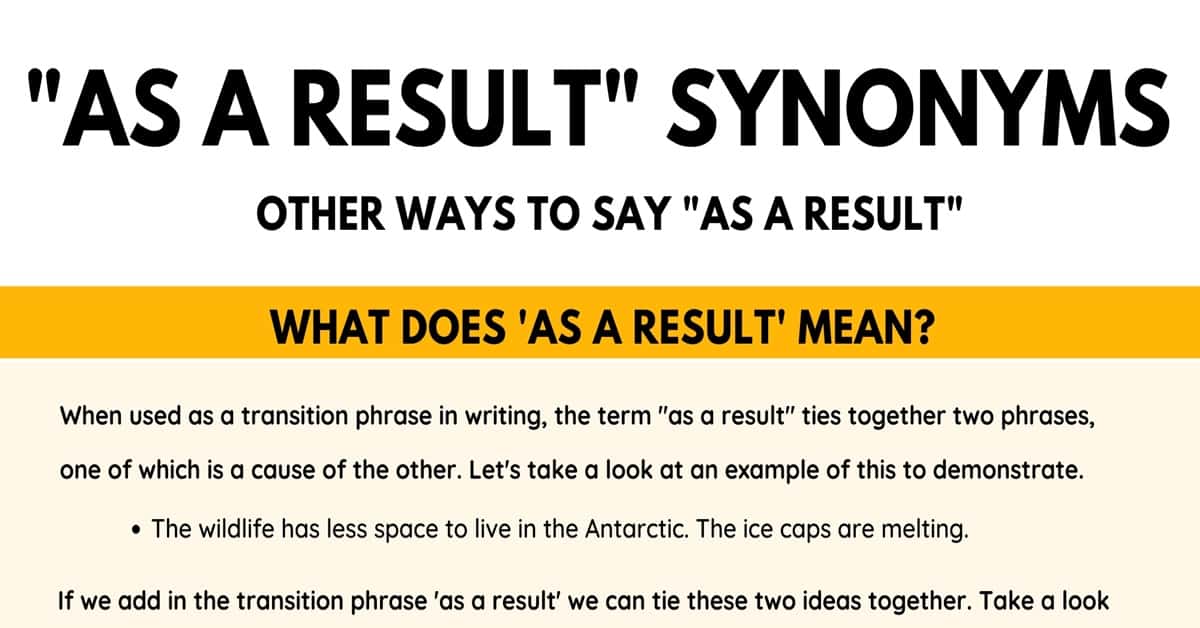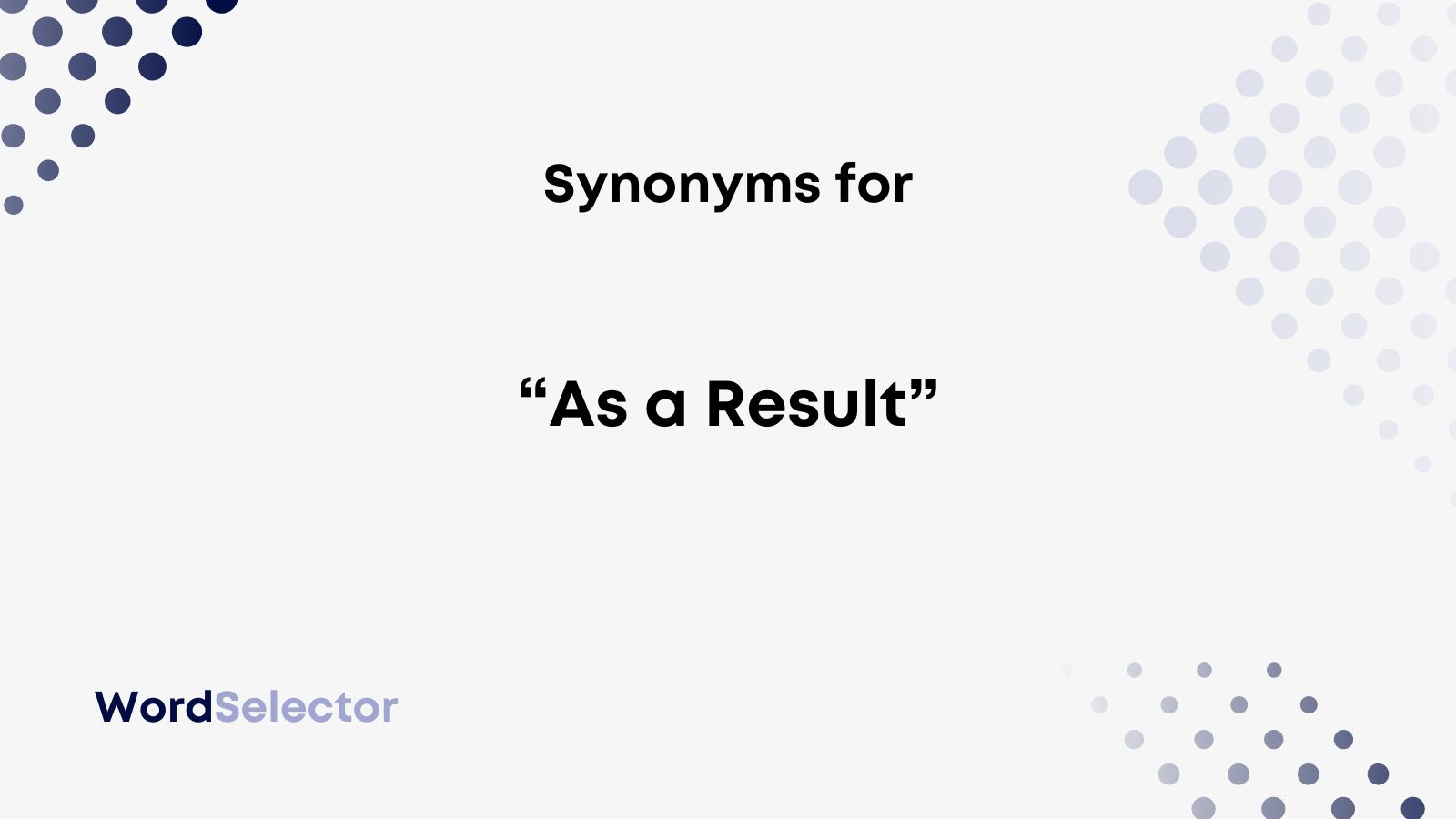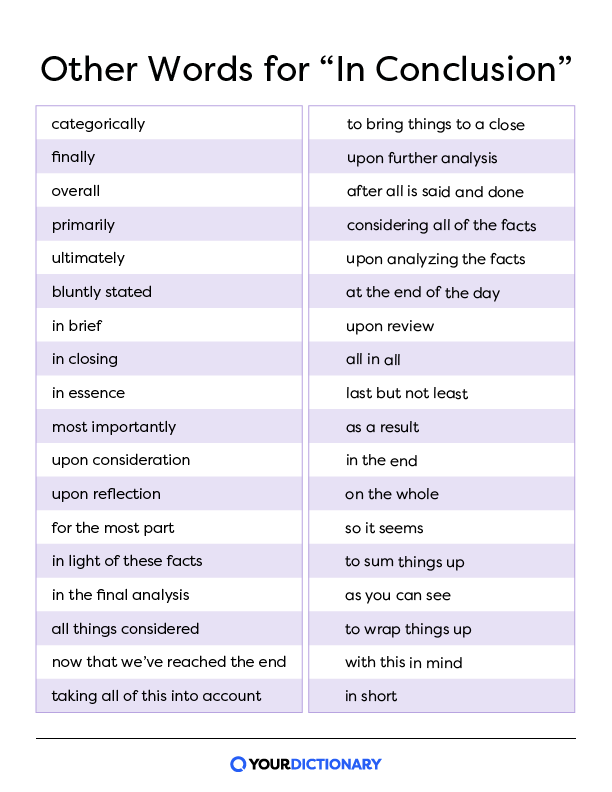Other Words For As A Result

In an age defined by precision and clarity, the humble phrase "as a result" finds itself under increasing scrutiny. Language, the cornerstone of effective communication, demands nuance. Relying on a single phrase, however common, can lead to monotony and a diminished impact on the reader.
This isn't simply a matter of stylistic preference; it's about crafting compelling narratives that resonate with diverse audiences. In professional writing, academic discourse, and everyday communication, the ability to articulate cause and effect with variety and sophistication is paramount.
The issue at hand is not about banishing "as a result" from our vocabulary. Instead, it is about expanding our linguistic toolbox to better serve the complexities of the information we convey.
The Problem with Monotony
Repetitive language dulls the senses. When a reader encounters the same phrase repeatedly, their engagement diminishes. This holds especially true in longer texts or presentations.
Academic papers, business reports, and even news articles benefit from a diverse range of expressions.
The consistent use of “as a result” can even make writing seem lazy or uninspired, regardless of the underlying quality of the content.
A Thesaurus of Alternatives
The English language boasts a rich selection of synonyms and related phrases to express causality. Choosing the right alternative depends on the specific context and the desired emphasis.
Consequently, therefore, and hence offer more formal alternatives, suitable for academic and professional settings. Each of these words carries a slightly different connotation, with 'hence' suggesting a more logical or deductive connection.
For less formal writing, options such as so, thus, and because of this can be employed. These alternatives often contribute to a more conversational and approachable tone.
To emphasize the direct and immediate nature of the effect, consider phrases like in consequence, due to this, or on account of. These options highlight the direct link between the cause and the outcome.
For expressing a sequence of events, use phrases such as subsequently, thereafter, or following this. These alternatives convey a temporal relationship in addition to the causal one.
To indicate something that follows logically or inevitably, consider using accordingly, inevitably, or naturally. These terms suggest that the outcome was predictable or unavoidable given the preceding circumstances.
Beyond Single Words
The alternatives aren't limited to single-word replacements. Sometimes, rephrasing the sentence entirely is the most effective solution.
Consider transforming "As a result of the heavy rain, the river flooded" into "The heavy rain caused the river to flood," or "The river flooded because of the heavy rain". This shifts the focus and provides a more direct and impactful statement.
Using verbs that inherently imply causality, such as caused, led to, prompted, or triggered, can eliminate the need for a transitional phrase altogether. This approach contributes to a more concise and dynamic writing style.
Context is Key
The most effective alternative to "as a result" will always depend on the specific context. The tone, audience, and the nature of the causal relationship should all influence the choice.
In a scientific paper, for example, consequently or therefore might be the most appropriate choices. In a blog post, so or thus might be more fitting.
Careful consideration of the nuances of each alternative allows writers to craft prose that is both accurate and engaging.
The Impact on Readability
Varying sentence structure and word choice dramatically improves readability. Readers are more likely to remain engaged when they are not confronted with repetitive language.
Increased readability leads to better comprehension and retention of information.
This benefits not only the reader but also the writer, who can be assured that their message is being received effectively.
Expert Opinions
Dr. Emily Carter, a Professor of Linguistics at the University of California, Berkeley, emphasizes the importance of stylistic versatility. "Writers should strive to master a range of expressions to avoid sounding repetitive and uninspired," she notes.
She adds, "The choice of words reflects not only a writer's skill but also their attentiveness to the reader. Varying the language indicates a conscious effort to make the text more engaging and accessible."
According to a study published in the *Journal of Writing Research*, texts that employ a variety of transitional phrases are perceived as more credible and persuasive. This suggests that linguistic diversity can have a significant impact on how readers evaluate the quality of the writing.
Looking Ahead
The movement towards more nuanced and varied language is likely to continue. As communication becomes increasingly digital and global, the ability to express complex ideas with clarity and precision will become even more important.
Educational institutions and professional organizations are already placing greater emphasis on writing skills. This includes training in the use of a wider range of vocabulary and sentence structures.
The future of effective communication lies in embracing linguistic diversity and striving for greater clarity and impact in our writing.


















